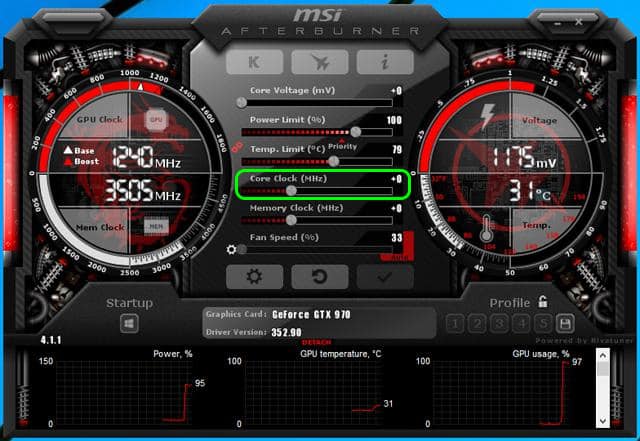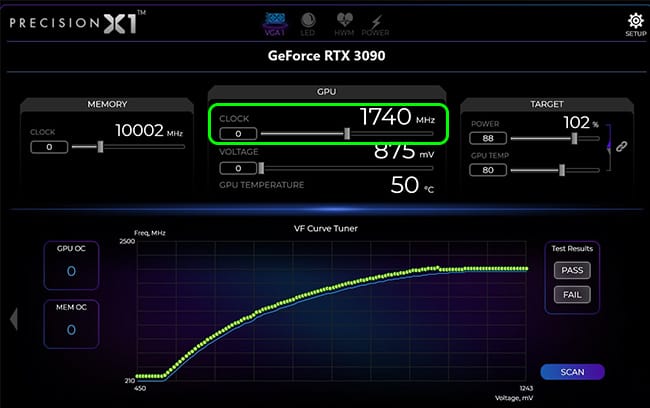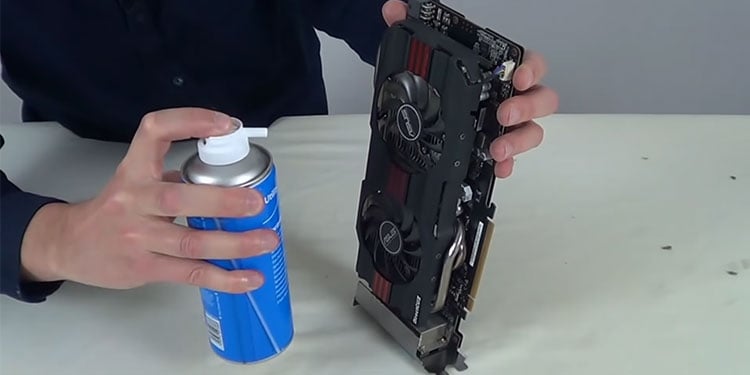Underclocking your GPU is easier than you might expect because most manufacturers include management software for free with your graphics card.
Why You Should Underclock Your GPU
Many surprising positive things can come from underclocking your GPU. Consider whether these are worth the reduction in performance that will come when you make the adjustments.
Your card will most likely last longer. While it’s impossible to tell how long a PC component will last, underclocking your GPU will help it run at a lower temperature. Doing so will help it take less damage from the heat and should make it work longer. While you aren’t getting the full performance possible, you have a graphics card that is less likely to burn out before you’re ready to replace it.You might see some savings on your electric bill. The harder your GPU works, the more power it draws – and graphics cards are known for being electricity hogs. If you use your computer often with your graphics card clocked normally or overclocked, underclocking it might reduce your power bill a surprising amount.Your GPU might be quieter when you underclock it. A graphics card reacts to how much heat it’s generating by increasing the speed of the fans, which can be pretty loud. Many people have heard their computers referred to as sounding like jet engines. That comes from the fans roaring.
So there are a few different things that might make underclocking your GPU worth it.
Who Shouldn’t Underclock Their GPU
You shouldn’t underclock your GPU if you need the performance that it offers with its standard settings. Certain programs and features require extremely high-functioning GPUs and underclocking it will negate the purpose of having a high-end GPU if you’re using it underclocked with these problematic programs. I see a performance hit when I underclock my GPU, which I occasionally do to reduce the heat my computer is generating. While I can still run ESO on high graphics, I struggle with ARK Survival because it is so much more graphically demanding.
What Does Underclocking Your GPU Actually Do?
Underclocking your GPU reduces the speed of the core clocks that perform the functions of the graphics card. These determine how well your card works and what kind of graphics quality you see. Once you’ve underclocked the GPU, these will work slower, drawing less power and delivering less performance.
How to Underclock a GPU
Underclocking a GPU doesn’t require removing it from your computer, luckily. You use software that corresponds to your particular GPU to adjust how it performs.
MSI
MSI Afterburner is available for free from MSI. It has a lot of different tools to manage what your graphics card does and how it performs. It’s similar to other software that you use to change the clock rate on your GPUs It’s that simple! Your GPU shouldn’t work quite so hard now, and you can still play games and use programs that require graphics processing power.
EVGA
To adjust the settings on your EVGA GPU, use Precision X1. It helps you manage various EVGA products, including graphics cards. You don’t need to adjust the memory clock, the voltage, or the temperatures unless you choose to. However, doing so might help you manage your graphic’s card heat and performance more closely if you desire. Other GPUs should be able to use these programs. If they don’t connect, simply look for GPU management software included with your card.
Other GPU Adjustment Settings
There are a few other things you might want to adjust in your GPU software if you’re having difficulty with your card. While there are many reasons to underclock a GPU, you can also find good results doing a few other things if your issue is thermals.
Cooling and Fans
You always want your GPU to be kept as cool as possible. The fans and heat dissipation system in your PC should help keep things cool. However, keep an eye on your AIO or air cooling system to ensure they’re still functioning correctly. It’s very easy for them to stop working without you noticing at first – except for the creeping temperature on your GPU.
Cleaning Your GPU
While you don’t need to take your GPU apart and soak it in alcohol to get it clean, there are still a few things you should be doing. Always check to ensure the fans are free of dust or debris that might stop them from spinning correctly. Regularly blow dust out of your computer. Build-up not only heats your graphics card, but it can also damage the delicate electronics in it.
Temperature Management
Most software like MSI Afterburner also has an option to set a temperature limit. When I’m struggling to keep things cool while playing a highly modded game on Ultra settings, I sometimes drag my temperature limit down to 80 to ensure that nothing goes over that setting. Doing this will lower the performance of my card. However, it also stops my game from shutting down and my computer from being damaged by overheating. Ultimately, it’s worth it when I try to use demanding programs.
Undervolting
You can also lower the voltage of your GPU to make it work less hard and see lower temperatures. Essentially, it won’t be able to draw as much power. You won’t see the impressive performance you might expect at full blast, but it will help it last longer and provide some of the same benefits of underclocking. You should undervolt a bit at a time to see what the sweet spot is for your card and usage. You can do it in the same programs where you underclock the GPU.
Is Underclocking Safe for My GPU?
Underclocking is definitely safe for your graphics card. You’re simply telling it not to perform at its highest capacity. Doing so shouldn’t damage it in any way. If anything, underclocking the GPU might actually extend the life of your graphics card. If you notice any issues after you underclock your GPU, you can always change it to perform at its base rate. I adjust my rates regularly depending on what I’m doing with my computer.
Does Underclocking GPU Increase FPS?
Underclocking your GPU will likely not increase your frames-per-second. You might see improvements in your computer’s thermals and performance, but frames may even lower because the graphics card isn’t operating with as much power. If your frames are too low, try bumping your underclock up, so the GPU runs with more power.
Why Is My GPU Clock So High?
Your GPU might be working on a challenging task when it shoots up higher than usual. For example, you might see the clock number shoot up if you’re in a demanding game and loading into a complex area. However, that’s not always a bad thing – it requires this harder work to get specific tasks done. If your GPU is spiking up and down when you aren’t doing anything on the computer, you may want to see if any background programs require it to perform complex tasks. If not, keep an eye on it to see whether the spikes are due to excessive heat or hardware failure.
Why Is My GPU Downclocking?
If you notice your GPU turning down the clock and reducing performance, it might be that the unit is too hot for safety. Your GPU will throttle itself when it detects some kind of danger to prevent it from breaking. You may notice that if it gets too hot, the GPU can shut down.


